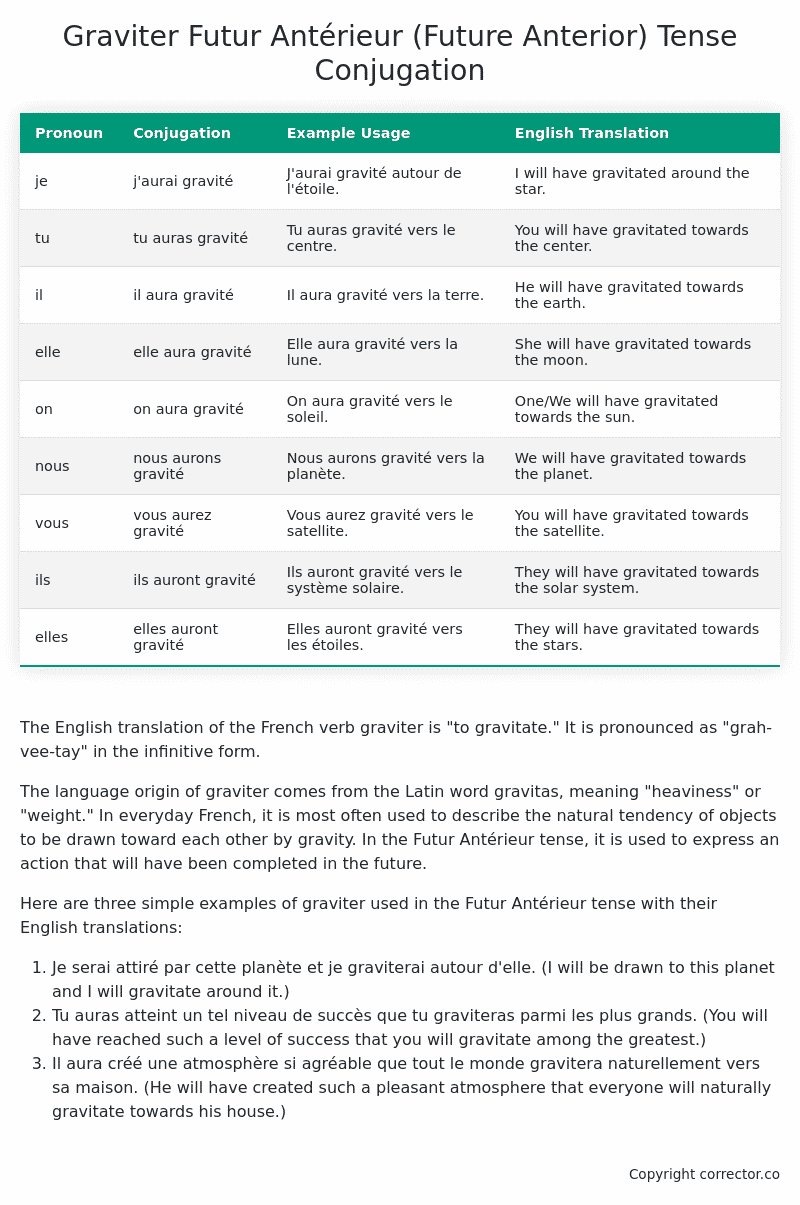Futur Antérieur (Future Anterior) Tense Conjugation of the French Verb graviter
Introduction to the verb graviter
The English translation of the French verb graviter is “to gravitate.” It is pronounced as “grah-vee-tay” in the infinitive form.
The language origin of graviter comes from the Latin word gravitas, meaning “heaviness” or “weight.” In everyday French, it is most often used to describe the natural tendency of objects to be drawn toward each other by gravity. In the Futur Antérieur tense, it is used to express an action that will have been completed in the future.
Here are three simple examples of graviter used in the Futur Antérieur tense with their English translations:
- Je serai attiré par cette planète et je graviterai autour d’elle. (I will be drawn to this planet and I will gravitate around it.)
- Tu auras atteint un tel niveau de succès que tu graviteras parmi les plus grands. (You will have reached such a level of success that you will gravitate among the greatest.)
- Il aura créé une atmosphère si agréable que tout le monde gravitera naturellement vers sa maison. (He will have created such a pleasant atmosphere that everyone will naturally gravitate towards his house.)
Table of the Futur Antérieur (Future Anterior) Tense Conjugation of graviter
| Pronoun | Conjugation | Example Usage | English Translation |
|---|---|---|---|
| je | j’aurai gravité | J’aurai gravité autour de l’étoile. | I will have gravitated around the star. |
| tu | tu auras gravité | Tu auras gravité vers le centre. | You will have gravitated towards the center. |
| il | il aura gravité | Il aura gravité vers la terre. | He will have gravitated towards the earth. |
| elle | elle aura gravité | Elle aura gravité vers la lune. | She will have gravitated towards the moon. |
| on | on aura gravité | On aura gravité vers le soleil. | One/We will have gravitated towards the sun. |
| nous | nous aurons gravité | Nous aurons gravité vers la planète. | We will have gravitated towards the planet. |
| vous | vous aurez gravité | Vous aurez gravité vers le satellite. | You will have gravitated towards the satellite. |
| ils | ils auront gravité | Ils auront gravité vers le système solaire. | They will have gravitated towards the solar system. |
| elles | elles auront gravité | Elles auront gravité vers les étoiles. | They will have gravitated towards the stars. |
Other Conjugations for Graviter.
Le Present (Present Tense) Conjugation of the French Verb graviter
Imparfait (Imperfect) Tense Conjugation of the French Verb graviter
Passé Simple (Simple Past) Tense Conjugation of the French Verb graviter
Passé Composé (Present Perfect) Tense Conjugation of the French Verb graviter
Futur Simple (Simple Future) Tense Conjugation of the French Verb graviter
Futur Proche (Near Future) Tense Conjugation of the French Verb graviter
Plus-que-parfait (Pluperfect) Tense Conjugation of the French Verb graviter
Passé Antérieur (Past Anterior) Tense Conjugation of the French Verb graviter
Futur Antérieur (Future Anterior) Tense Conjugation of the French Verb graviter (this article)
Subjonctif Présent (Subjunctive Present) Tense Conjugation of the French Verb graviter
Subjonctif Passé (Subjunctive Past) Tense Conjugation of the French Verb graviter
Subjonctif Imparfait (Subjunctive Imperfect) Tense Conjugation of the French Verb graviter
Subjonctif Plus-que-parfait (Subjunctive Pluperfect) Tense Conjugation of the French Verb graviter
Conditionnel Présent (Conditional Present) Tense Conjugation of the French Verb graviter
Conditionnel Passé (Conditional Past) Tense Conjugation of the French Verb graviter
L’impératif Présent (Imperative Present) Tense Conjugation of the French Verb graviter
L’infinitif Présent (Infinitive Present) Tense Conjugation of the French Verb graviter
Struggling with French verbs or the language in general? Why not use our free French Grammar Checker – no registration required!
Get a FREE Download Study Sheet of this Conjugation 🔥
Simply right click the image below, click “save image” and get your free reference for the graviter Futur Antérieur tense conjugation!

Graviter – About the French Futur Antérieur (Future Anterior) Tense
Construction
Common Everyday Usage Patterns
Interactions with Other Tenses
For example
Summary
I hope you enjoyed this article on the verb graviter. Still in a learning mood? Check out another TOTALLY random French verb conjugation!


